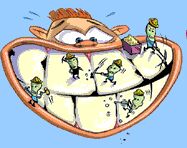Dr. Hall,
I have extensive damage to my teeth from years of drinking energy drinks, and now my gums are bleeding when I brush or floss. I think I might need dentures.
– Michelle from Florida
(See Dr. Hall’s answer below.)
We thank our advertisers who help fund this site.
Michelle,
Not being able to see you, I don’t know how much damage you’re talking about and whether or not you need dentures, but I’ll try to say some helpful things about your situation.
First, on decay from drinking sodas or anything sweet. I remember a study that was referenced when I was in dental school. There is some island in the South Seas where the people consumed high levels of sugar but had very little tooth decay, and investigators wanted to find out why. When they investigated, they found out that their sugar was from sweet drinks and it was consumed almost entirely at mealtimes. What they learned was that if the sugary drink was cleared quickly from your mouth it really didn’t contribute significantly to decay.
Where some people get in trouble with sugary drinks is when they let it sit in their mouth before swallowing it. I saw this in my practice. Decay would form around the necks of the back teeth, particularly on the insides of the lower molars. This is accentuated if you take little sips throughout the day and don’t swallow right away. And then when the dentist fills these decayed spots, if you continue this habit, you will keep getting new decay around the edges of the fillings.
You can drink the same drinks, but if you take bigger gulps and then just swallow rather than hold it in your mouth, it will greatly reduce the negative effect on your teeth, and you may not get any cavities in these spots. Think what you are doing when you drink a sugary drink—you are feeding the bacteria. The longer it sits there, the longer they have to feed.
And then about the bleeding gums. Bleeding gums are a symptom of gingivitis—the early stage of periodontal disease. Periodontal disease is also caused by bacteria. Change how you are feeding the bacteria, and keep your teeth clean with brushing and flossing and have them professionally cleaned regularly, and it should go away. Some people have a tendency, when their gums bleed, to stay away from the gums when they brush, but that is the exact opposite of what they need to do. You need to brush away the bacteria that are on your teeth right at the gumline in order for the gums to heal.
– Dr. Hall
Do you have a comment or anything else to add? We’d love to hear from you. Enter your comment below. Or click here to ask Dr. Hall a question.
About David A. Hall
Dr. David A. Hall was one of the first 40 accredited cosmetic dentists in the world. He practiced cosmetic dentistry in Iowa, and in 1990 earned his accreditation with the American Academy of Cosmetic Dentistry. He is now president of Infinity Dental Web, a company in Mesa, Arizona that does advanced internet marketing for dentists.

 created when you eat and mouth bacteria feed on the carbohydrates you eat. There are minerals in your saliva and enzymes that repair the enamel. This idea that there is any decay or other damage to the teeth during the sleep of mouth breathers is a hypothesis based on this one tiny observation. And while the article correctly phrased this hypothesis as “may increase tooth decay risk,” the “may” is lost on too many people. It’s a guess that “may” warrant further study.
created when you eat and mouth bacteria feed on the carbohydrates you eat. There are minerals in your saliva and enzymes that repair the enamel. This idea that there is any decay or other damage to the teeth during the sleep of mouth breathers is a hypothesis based on this one tiny observation. And while the article correctly phrased this hypothesis as “may increase tooth decay risk,” the “may” is lost on too many people. It’s a guess that “may” warrant further study.